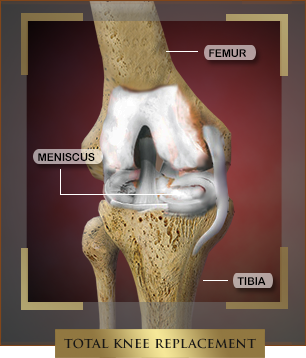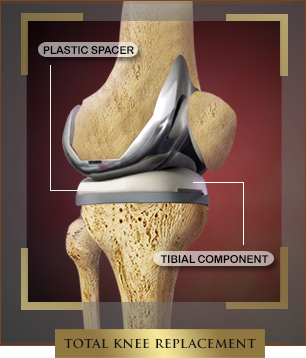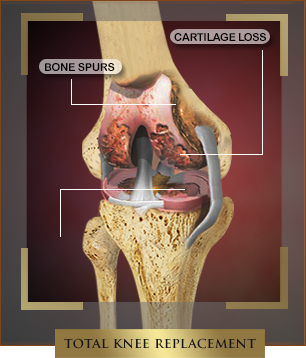If you or someone you love suffered a serious knee injury during a preventable accident, a broken bone injury attorney at Trial Pro may be able to help you seek compensation. With more than a century of combined experience behind us, and millions of dollars in verdicts and settlements to our name, we are Florida’s trusted choice for personal injury claims of every size and nature.
At Trial Pro we work to help knee injury victims seek compensation for damages such as:
- Past, present, and future medical bills
- Permanent scarring and / or disfigurement
- Lost wages and / or lost earning potential
- Physical and emotional pain and suffering
If a serious knee injury required total knee replacement surgery, you may be entitled to compensation. Contact a Florida broken bone injury lawyer at our office to learn more.
 Torn Meniscus
Torn Meniscus
A torn meniscus is probably the most common knee injury. Any twisting or rotating motion can tear the meniscus, especially while putting the pressure of your full weight on the knee. Symptoms include:
- Popping sensation
- Swelling
- Stiffness
- Knee pain
- Inability to straighten the knee
- Locking sensation
A torn meniscus can lead to knee instability or inability to move the knee and it can lead to arthritis. Therapy and over-the-counter medication is the first step in treatment. If this fails, your doctor may recommend surgery. If the tear cannot be repaired, the meniscus will be surgically trimmed. This is done through an arthroscope.
Medical Collateral Ligament Tears / MCL Tears
The medial collateral ligament is a broad, thick band that runs down the inner part of the knee, from the femur to about 4-6 inches from the top of the tibia. The function of the MCL is to prevent the leg from over-extending inward and allows the knee to rotate. Injuries to the MCL commonly occur as a result of a strong force hitting the outside of the knee. MCL tear symptoms include pain or tenderness, stiffness, and swelling. The knee may feel unsteady or may lock or catch. It typically takes 6 weeks for an MCL injury to heal. Treatment can include: resting, ice, pain medication, and / or wearing a lightweight cast for movement restriction.
Anterior Cruciate Ligament Tears/ ACL Tears
The ACL is in the middle of the knee. It prevents the shin bone from sliding out the front of the thigh bone. An ACL tear occurs when a sudden change in direction or pivot occurs on a locked knee. A pop, followed by swelling of the knee, are the most common symptoms. Non-surgical treatment such as physical therapy and rehabilitation may be recommended. Surgical treatment is usually advised when dealing with combined injuries of the knee. ACL tears are not usually repaired using suture to sew it back together because repaired ACLs have generally been known to fail over time.
 Patella Fracture
Patella Fracture
As the kneecap (patella) acts as a shield for your knee joint, it is easily broken. Falling onto your knee is the most common cause of patellar fractures; however, they can also be caused from a motor vehicle collision. The thigh muscles can contract so violently that it pulls the patella apart. These fractures are serious and most often require surgery to heal. They can also cause arthritis. Men are more likely to fracture their patella than women. The symptoms usually include: bruising, inability to straighten the knee, and inability to walk. X-rays are the best way to check for patella fractures. If the pieces of broken bone have not been displaced, the leg will be placed in a non-weight bearing cast for 6-8 weeks. If the patella has been displaced, surgical intervention is required.
 Full Open Knee Surgery
Full Open Knee Surgery
Knee replacement surgery is recommended when other treatments do not help with a stiff, painful knee and performing simple activities has been affected as a result. This surgery is typically for adults over 50 who have osteoarthritis. An 8-12 inch cut is made in the front of the knee and the damaged part of the joint is removed from the surface of the bones, which are then shaped to hold a metal or plastic artificial joint. The damaged part of the joint is removed from the surface of the bones and the surfaces are then shaped to hold a metal or plastic joint. The average hospital stay after knee surgery is typically 3-5 days. A walker or cane will be given for ambulation and once muscle strength is restored, physical therapy will be prescribed.
Arthroscopic Knee Surgery
Knee arthroscopic surgery is a procedure performed through a small incision in the skin to repair injuries to tissues, ligaments, cartilage or bone within the knee joint area. The surgery is conducted with the use of an arthroscope, which is guided by a light attached to a television monitor. Arthroscopic knee surgeries range from minimal procedures such as flushing out bone fragments to the realignment of a dislocated knee and ligament grafting. Advantages of arthroscopic surgery include: less anesthetic, less incision, and less recovery time. After arthroscopic surgery, the patient is placed in a leg brace for 6-8 weeks while the knee heals. Physical therapy is generally prescribed after the incision site is healed.
Total Knee Replacement Surgery
If the knee is severely damaged, it may be hard to walk. If conservative treatment fails, joint replacement surgery will most likely be recommended. Knee replacement surgery is one of the most successful medical procedures in these cases.
 During the surgery, damaged cartilage surfaces at the ends of the femur and tibia are removed, along with a small amount of underlying bone. The removed cartilage and bone is then replaced with metal components that recreate the surface joint. The undersurface of the patella is cut and resurfaced with a plastic button.
During the surgery, damaged cartilage surfaces at the ends of the femur and tibia are removed, along with a small amount of underlying bone. The removed cartilage and bone is then replaced with metal components that recreate the surface joint. The undersurface of the patella is cut and resurfaced with a plastic button.
Knee injuries that require total knee replacement surgery can have long-lasting effects on the individuals who suffer from them. Not only is the procedure expensive and painful, but the recovery time post-operation can prevent a patient from quickly returning to work and resuming his or her full earning potential. We’re here to make sure victims don’t suffer unnecessarily from these repercussions.
Get Your Free Knee Injury Consultation Today
It’s not too late to contact an attorney after your surgery. Depending on the specifics of your case, you may still be able to pursue compensation for your injury. We encourage you to call us at 800-874-2577 to learn more. During a free consultation, we can review your case and determine your best options for moving forward.











